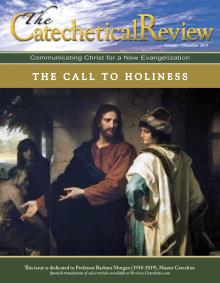Con demasiada frecuencia, los responsables de la formación de la fe para adultos en sus parroquias dejan a un lado al Catecismo de la Iglesia Católica por ser demasiado difícil y, por lo tanto, demasiado abrumador para su auditorio. Quizás también lo consideren irrelevante para la experiencia de la gente, poco práctico o personal, o poco inspirador. Sin embargo, hacer caso omiso al Catecismo como recurso fundamental en la formación de la fe de los adultos sería perjudicar al Pueblo de Dios. El Catecismo es un don de la Iglesia – o más propiamente, del Espíritu Santo, obrando por medio de los sucesores de los apóstoles, para todos los miembros del Cuerpo de Cristo. En su Constitución Apostólica sobre el Catecismo, el Papa Juan Pablo II dice claramente que el Catecismo se ofrece “a todos aquellos fieles que deseen conocer mejor las riquezas inagotables de la salvación” (cf. Ef 3,8).” No es un documento seco, sino uno repleto de vida. “Está orientado a la maduración de esta fe, su enraizamiento en la vida y su irradiación en el testimonio” (CEC 23). El Catecismo es un documento formativo – tiene el poder para transformar al corazón y a la mente de quien lo lea.
El Catecismo es un poderoso instrumento de formación porque expresa tan clara y hermosamente las verdades de los misterios cristianos, y la interconexión entre ellas. Cada doctrina es presentada desde sus fundamentos en la Sagrada Escritura – con su poder para penetrar a las mentes y los corazones, y a través de sus fuentes en la Tradición, tal y como lo expresaron los padres y doctores de la Iglesia, los concilios, y los santos. Las verdades se presentan en su riqueza y profundidad. La persona humana encuentra esta belleza, orden y coherencia irresistible. Hay un principio fundamental en acción aquí: la verdad (de la Revelación), cuando es expresada adecuadamente en sí misma (es decir, hermosamente) habla a nuestro corazón y mente, atrayéndonos hacia dentro. En todas las doctrinas, contemplamos la forma de Cristo, y somos extasiados (tomo prestada esta expresión de Hans Urs von Balthasar): somos cautivados de tal modo que nos impulsa para responder a Cristo mismo con nuestro abandono a la fe. En corto, la belleza convierte.
The rest of this online article is available for current Guild members.
This article is from The Catechetical Review (Online Edition ISSN 2379-6324) and may be copied for catechetical purposes only. It may not be reprinted in another published work without the permission of The Catechetical Review by contacting [email protected]


















